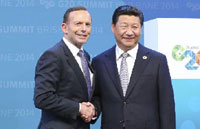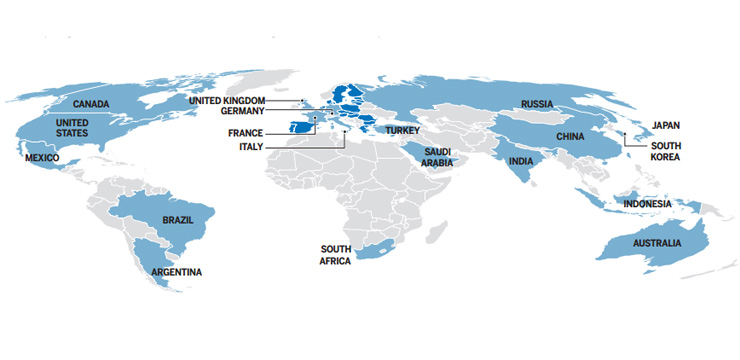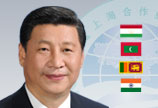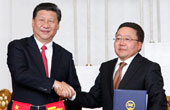China, Australia announce virtual conclusion of FTA negotiations
CANBERRA - Chinese President Xi Jinping and Australian Prime Minister Tony Abbott announced here Monday that their countries have practically completed negotiations on a free trade agreement (FTA).
The announcement capped nine years of bilateral FTA talks. China has now become Australia's largest trading partner, export market and source of imports.
A landmark free trade deal is due to be signed Monday, which will open up Chinese markets to Australian farm exporters and the services sector while easing curbs on Chinese investment in Australia.

China to contribute to global economy: Xi
Xi is paying a state visit to Australia after attending the G20 summit at the weekend in Brisbane. His visit was also scheduled to include stops in Sydney and Tasmanian state capital Hobart.
Reaching a China-Australia FTA will be of great significance to the two countries' economic relations, Chinese Vice Finance Minister Zhu Guangyao said on the sidelines of the just-concluded Group of Twenty (G20) summit in Brisbane.
"I look forward to making further announcements on this landmark agreement later today," Abbott said in a statement.
Australia is attempting to transition from a reliance on exports of minerals such as coal and iron ore to expanding its food and agricultural exports to a growing Asian middle class, moving from a "mining boom" to a "dining boom".
Paul Glasson, the National vice President of the Australia China Business Council, hailed the much-improved access for up to 40 service industries including health, law and aged care, as well as for agricultural products such as dairy, rice, wheat, wool and cotton.
"Up to 95 percent of our exports over time will enter the Chinese market tariff free," parliamentary secretary Josh Frydenberg said in a television interview on Sunday.
The agreement will give Australian dairy farmers tariff-free access within four years to China's infant formula market, minus any of the "safeguard" caps that currently restrict competitors from New Zealand, the Sydney Morning Herald reported, citing sources.
"Australia has been marginalized from being a major exporter to China in the last few years, one of the reasons being that milk production (there) has been going down over the last decade," said Sandy Chen, dairy analyst at Rabobank in China.
Wine makers, currently selling more than A$200 million worth of goods to China each year despite tariffs of between 14 and 30 percent, will also see tariffs eliminated over four years, it reported.
Tariffs on horticultural products, seafood and other goods accounting for 93 percent of Australian exports by value will also be reduced to zero by 2019, according to the newspaper.
The Minerals Council of Australia said it understood that the agreement would eliminate a 3 percent coking coal tariff immediately and a 6 percent tariff on thermal coal within two years.
Related Stories
China-Australia FTA negotiation in full swing: Chinese official 2014-11-15 16:50
China-ROK FTA represents opportunities, challenges 2014-11-14 14:17
Business chances from China-ASEAN FTA introduced in Tianjin 2014-11-14 13:58
Upgraded version of ASEAN-China FTA 2014-11-13 18:12
Landmark FTA talks bear fruit 2014-11-11 08:18
China, ROK presidents vow cooperation as FTA talks conclude 2014-11-10 18:58
Background



